|
|
|
Sort Order |
|
|
|
Items / Page
|
|
|
|
|
|
|
| Srl | Item |
| 1 |
ID:
157931
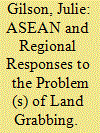

|
|
|
|
|
| Summary/Abstract |
Popularly represented as the phenomenon of “land grab,” changes in the acquisition, exploitation and significance of land across the world encapsulate myriad needs, motivations, and strategic ambitions. What is becoming clear is that these diverse burgeoning twenty-first-century phenomena in the name of land increasingly define and structure many of the decisions made by states and international institutions today. Despite being one of the most pressing regional and international problems of the current era, however, the issue of land grab is not on the agenda of the Association of Southeast Asian Nations. Member states of this association have acknowledged the transboundary effects of many contemporary phenomena and work together to alleviate security concerns and enhance collective economic opportunities, and yet they face both institutional and cognitive barriers to any attempts to address collectively the problems related to land grabbing. This article aims to examine the contemporary political space navigated and contested within ASEAN and to define the problems inherent in finding a collective action solution to this complex dynamic set of issues.
|
|
|
|
|
|
|
|
|
|
|
|
|
|
|
|
| 2 |
ID:
078536
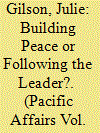

|
|
|
|
|
| Publication |
2007.
|
| Summary/Abstract |
In Japan, debates about the nature of peacekeeping contributions continue alongside questions regarding the relevance of Japan's constitution in the twenty-first century and the political implications of aid disbursement. This article seeks to illustrate how both Official Development Assistance and peacekeeping operations are being linked through Japan's "peace consolidation diplomacy." For historical reasons, the Japanese government has been unable to play a traditional peacekeeping role. At the same time, Japan's position as leading aid donor has received negative feedback from a recession-bound populous that now views key recipient countries as competitors rather than needy neighbours. As a result, issues pertaining to humanitarian intervention, peacekeeping and aid provision frequently overlap, as Japan searches for a means of playing a constructive international role commensurate with the expectations of the rest of the world and with Japan's own claim for a place on the permanent UN Security Council. This article examines Japanese debates surrounding the sending military personnel to crisis areas and the changing provision of aid, against a background of changing concepts of humanitarian intervention, peacekeeping and assistance. It illustrates how hte Japanese government utilizes a combined narrative of peacekeeping, humanitarian intervention and aid giving, in order simultaneously to soften the public response to sending peacekeepers and to respond to increasingly targeted international demands for a more substantial Japanese contribution to conflict resolution.
|
|
|
|
|
|
|
|
|
|
|
|
|
|
|
|
| 3 |
ID:
051398
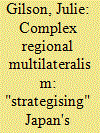

|
|
|
| 4 |
ID:
192546
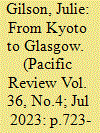

|
|
|
|
|
| Summary/Abstract |
The term ‘climate leadership’ became popular in the 1990s, in relation to international negotiations aimed at reducing greenhouse gas emissions and other environmental mitigations. Since that time, international attention – borne out by scientific study and a rapidly changing planetary climate - has shifted from global warming, the ozone layer and greenhouse gas emissions, to energy production, scientific innovation, and, by the 2020s, a strong focus on decarbonisation and securing net zero carbon output by the middle of the century. One important strand of negotiation has been the annual Conferences of the Parties (COP) to the United Nations Framework Convention on Climate Change (UNFCCC), which have witnessed different states playing lead roles at different times. By interrogating the main academic debates about climate leadership, this article examines Japan’s participation in the COP process along a structural-normative axis. In so doing, it charts the path from Japan’s apparent success at Kyoto in 1997 and its growing green reputation, to its subsequent ‘fall from green’ in later years and in the wake of COP26 in 2021.
|
|
|
|
|
|
|
|
|
|
|
|
|
|
|
|
| 5 |
ID:
049770
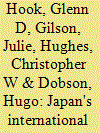

|
|
|
|
|
| Publication |
London, Routledge, 2001.
|
| Description |
xxxvi, 532p.
|
| Standard Number |
0415240972
|
|
|
|
|
|
|
|
|
|
|
|
Copies: C:1/I:0,R:0,Q:0
Circulation
| Accession# | Call# | Current Location | Status | Policy | Location |
| 044590 | 327.52/HOO 044590 | Main | On Shelf | General | |
|
|
|
|
| 6 |
ID:
111031
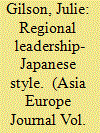

|
|
|
|
|
| Publication |
2012.
|
| Summary/Abstract |
The Japanese government faces many competing challenges as it seeks to balance its multilateral and bilateral relationships within and beyond the region: whilst addressing its rapidly changing contentious domestic politics, there is pressure for it to realign relations with the USA, manage the rise of China, strengthen links with its region and continue to deal with its lingering historical legacy. All of these demands are now set against the backdrop of a so-called 'lost decade' of economic woes and global economic recession. This article demonstrates how the Japanese government is apparently adopting a de facto multilevel foreign policy, attempting to engage in a range of bilateral and collective initiatives simultaneously and to assume a regional leadership role whilst having to manage difficult bilateral relations, notably with the USA and China.
|
|
|
|
|
|
|
|
|
|
|
|
|
|
|
|
| 7 |
ID:
097124
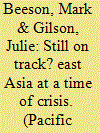

|
|
|
|
|
| Publication |
2010.
|
| Summary/Abstract |
This introduction to the articles that follow considers the impact of the apparent decline of the West and the likely impact of China's rise on the region in this period of surprising flux. We provide a brief analysis of the main issues that are affecting the Asia-Pacific's three most significant states - the United States, China and Japan. Key questions for all of them and for the rest of this collection are about the very nature and identity of the region itself, and its relationship to the global sphere.
|
|
|
|
|
|
|
|
|
|
|
|
|
|
|
|
| 8 |
ID:
077307
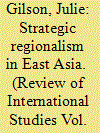

|
|
|
|
|
| Publication |
2007.
|
| Summary/Abstract |
The US, China and Japan are often portrayed as three giant states dominating the region of East Asia in perpetual potential conflict. This article proposes that such assessments should be tempered in the light of changing regional and global dynamics and, in particular, in view of the growing centrality of the region of East Asia itself for foreign policy agendas. Adopting a framework underpinned by the concept of strategic regionalism, this article focuses upon the developing collective identification of region, and assesses the possibility for joint leadership in East Asia
|
|
|
|
|
|
|
|
|
|
|
|
|
|
|
|
|
|
|
|
|